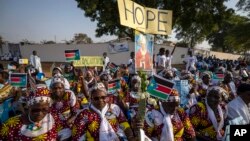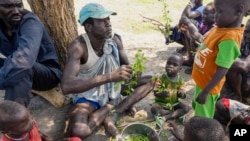The top United Nations official in South Sudan on Tuesday urged leaders in that country to accelerate implementation of the 2018 Revitalized Peace Agreement, including holding elections late next year.
"Now is not the time to take our eyes off the ball in South Sudan," Nicholas Haysom, head of the U.N. Mission in South Sudan, told the U.N. Security Council. "What we can learn from Sudan is how quickly hard-won peace gains can unravel."
This is a critical year for the world's youngest country. A new constitution must be drafted and preparations completed for the first national elections scheduled for December 2024.
"In our estimation, the constitution-making process is 10 months behind schedule, election planning eight months behind, and several aspects of the transitional security arrangements are hanging," Haysom reported.
He said it is possible for South Sudan to close the gap on election preparations. He urged legislators to pass the National Elections Act in parliament and establish the National Elections Commission.
After independence from Sudan in July 2011, South Sudan slid into more than five years of civil war, with forces loyal to President Salva Kiir battling supporters of Vice President Riek Machar.
Thousands died in the war, and more than 2 million fled to neighboring countries, including Sudan. Since mid-April, when a rivalry between two Sudanese generals turned into open conflict, more than 117,000 people have crossed back into South Sudan seeking safety. Haysom told council members that 93% of them are South Sudanese returning home.
"I want to commend the government of South Sudan for its open border policy to all those who are fleeing the conflict, with or without travel documents," Haysom said. "The absorption capacity of the government and humanitarians, however, is under strain, with limited local resources and bottlenecks of arrivals in South Sudan's border towns, notably in Renk."
Before the conflict erupted in Sudan, at least 9.4 million people in South Sudan needed humanitarian assistance. That number is likely to rise with the returnees.
Haysom noted that the fighting in Sudan is also impacting South Sudan's economy, as many goods imported from its northern neighbor have been disrupted, driving up prices. South Sudan's economy is dependent on its oil exports, which Haysom noted go out via Port Sudan. Their interruption could have devastating effects on the economy.





